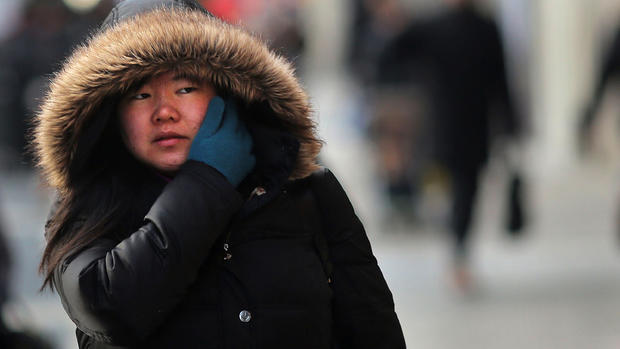Winter skin woes: Tips to stay protected
Frigid temperatures have been making their way across the United States, with polar air going from the Midwest to the Northeast throughout the past week, causing wind-chill warnings along the way.
Winter weather can especially wreak havoc on a person's skin, causing it to become dry, cracked and itchy. What's actually causing the dryness is not the cold weather itself, but the lack of humidity that the winter brings, explains Dr. Karthik Krishnamurthy, co-director of the cosmetic clinic at Montefiore's Center for Dermatology, Cosmetic and Laser Surgery in the Bronx, New York City.
What's more, people may be making their dry skin worse as they try to stay warm.
"We're all tempted to take long hot showers because it's cold outside," Krishnamurthy told CBSNews.com. "But that's a pretty big mistake," he said, because the heat causes more dryness.
Krishnamurthy, who is also assistant professor of dermatology at Albert Einstein College of Medicine in New York, urges everyday steps to "winter-proof" the skin to prevent not only itchy dry skin, but more serious infections -- because bacteria can move into the cracks in the skin. The elderly, young children or people with weakened immune systems, such as those undergoing chemotherapy, may be especially at risk for rare cases in which the infection travels deep into the bloodstream, said Krishnamurthy.
What should people do to stay ahead of winter skin woes?
"The most important thing is to moisturize," he explained. Krishnamurthy recommends applying an oil-based lotion on the skin immediately after showering or bathing -- while the skin is still wet. Daily moisturizing creates an oily barrier on the skin, enabling you to retain your body's natural moisture and preventing the dry air from drawing it out. People with especially dry skin should use petroleum jelly or baby oil, he said.
"Many people are skeptical, but in a few weeks are amazed by the difference and lack of greasiness, if done while the skin is still moist," he added.
However, it's worth noting that not all lotions contain oil, and by definition, some just contain powder and water. He said using those lotions could actually increase skin dryness.
Since hot showers can cause dry skin, Krishnamurthy recommends using lukewarm water and keeping showers to no more than 10 minutes, only once per day. The longer the shower, he said, the greater the loss of natural oils and nutrients that protect the skin.
One thing to keep in mind for children, he added, was bubble baths can make the skin dryer because sitting in soapy water also strips the skin's protective oils. Children with no history of skin problems may develop eczema in the winter, he said, so try to avoid long baths.
- Polar air mass keeps icy grip on Northeast
- Deep freeze to last into weekend in eastern U.S.
- How to avoid frostbite, hypothermia
One huge misconception, according to Krishnamurthy, is that people can't get sunburn during the winter. However, he said they may be exposed to twice as many ultraviolet rays than in the summertime if snow is on the ground, because the sun's rays get reflected.
Other tips to winter-proof your skin that he recommends include maintaining a healthy diet full of B-vitamins, which are found in turkey, tuna, whole grains, lentils and bananas. Deficiencies in these vitamins can lead to dry, itchy skin. If you're tempted to drink alcohol to stay warm, you might also be risking your skin because beer and booze also deplete B-vitamins.
Also, get plenty of vitamin C, because low levels can cause fragile skin, according to Krishnamurthy.
And if you're staying indoors, too much heat or not enough heat can cause low humidity, so he recommends keeping a normal room temperature between 67 and 74 degrees F.
"Simple daily steps can 'winter-proof' the skin and help prevent more serious health conditions," he said.
